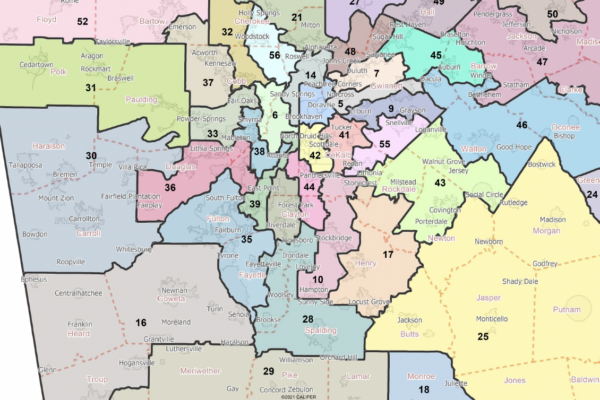ACLU Comment on Georgia Redistricting Ruling
Court Rules Georgia Redistricting Maps Likely Violate Voting Rights Act, But Allows Them To Remain in Effect For Next Election Cycle As Lawsuit Proceeds
ATLANTA — A federal court has ruled that Georgia’s newly drawn state House and Senate district lines likely violate the Voting Rights Act, but has allowed those plans to take effect while the lawsuit proceeds.
The American Civil Liberties Union, ACLU of Georgia, and international law firm WilmerHale are challenging the new maps on behalf of Alpha Phi Alpha Fraternity Inc., the Sixth District of the African Methodist Episcopal Church, and several Georgia voters.
The lawsuit charges the new maps deny Black Georgians an equal opportunity to participate in the political process and elect candidates of their choice.
In recent decades, Black citizens drove Georgia’s significant population growth, yet state lawmakers failed to draw district lines that reflect this reality. While the Black population in the state exploded, Black-majority districts have flatlined.
The Georgia General Assembly should have drawn at least a half-dozen additional new Black-majority districts in light of the tremendous growth of the state’s Black population over the last decade. Lawmakers could have drawn such districts in the southern and eastern parts of the Atlanta metro region, and in the area around Augusta, but failed to do so.
The groups challenged the maps in December 2021, and a preliminary injunction hearing was recently argued in federal court in Atlanta.
In a detailed 238-page ruling, the court agreed that the groups had demonstrated the new maps likely violate the Voting Rights Act. Nevertheless, it allowed the plan to take effect this year as the case is litigated, and has not provided a final ruling on the legality of the map under the Voting Rights Act.
The ruling means that the maps drawn by the General Assembly will be in effect for the upcoming 2022 elections. A trial is scheduled to be held in 2023.
The following reactions are from:
Sean J. Young, Legal Director, ACLU of Georgia: “We are encouraged that the court agreed that the maps passed by the state likely violate the Voting Rights Act, and we look forward to proving this at trial. Georgia voters deserve fair elections, and we will never stop fighting to protect the sacred and fundamental right to vote.”
Sophia Lin Lakin, Deputy Director, ACLU’s Voting Rights Project: “Our legal challenge is ongoing. We demonstrated that the General Assembly’s maps likely violate the Voting Rights Act and will prove it at trial. State legislatures are responsible for laws and policies that profoundly impact our daily lives. We will continue to fight these maps that deny Black voters an opportunity to elect representatives who will fight for them in these critical statehouse deliberations. Voters should choose their politicians — not the other way around.”
Bishop Reginald Jackson, Sixth District of the African Methodist Episcopal Church: “Throughout our history, the Sixth District of the AME Church has always fought to make voting more accessible for all voters. The AME Church will continue to make sure that all eligible voters in Georgia are able to cast their ballot, regardless of their race, creed, or political party.”
The case is Alpha Phi Alpha Fraternity Inc. v. Raffensperger.
Ruling: /legal-document/alpha-phi-alpha-fraternity-inc-v-raffensperger-order-denying-pi
Case details: /cases/alpha-phi-alpha-fraternity-inc-v-raffensperger
The ACLU has been watching key states across the country to ensure new electoral maps are fairly drawn, upholding the Fourteenth Amendment’s guarantee of equal protection and complying with the requirements of the Voting Rights Act of 1965. The ACLU has filed redistricting litigation in Ohio,South Carolina, Alabama, Georgia, and Arkansas.




